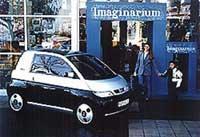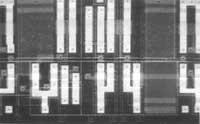Asking about the technology of the future
2000/07/09 Kortabarria Olabarria, Beñardo - Elhuyar Zientzia

Will they put chips in our brain?
Maybe yes, but not for long. For bioengineering silicon chips are only glass fractions. The installation of chips in the human brain is technically possible, but it is neither elegant nor necessary. Medicine and the military will have - or will find - reasons to do so, but they will not last long. In fact, changes in the field of biological computing and nanotechnology are frequent and rapid, so this technology would be a short time ago. And the reverse process? Putting neurons on computers? Yes, of course, but not so understood, but because we are going to make tools increasingly intelligent.
Is the future of robots?
According to nanotechnology supporters, in the future nanorobots will do everything from boat construction to food production, and of course more nanorobots. Since all things in this world are made up of molecules, in principle nanomastics would be able to build anything. But not everything is so beautiful. And if the nanorobot that is doing something per molecule was spoiled, what would happen? How to stop it?... doubt is there. However, nanotechnology will mark the next few years.
What will tomorrow's food look like?

Or in other words, will the future be that of genetically modified foods? Europeans in general are against GM foods, that is quite clear. Here there is not much need for biotech foods, because we are perfectly equipped with others. In developing or starving countries the question is limited to one question: Are the benefits of biotechnology greater than risks? Biotechnology can solve part of the problem but not everything. In fact, genetically modified vegetables cannot eliminate hunger, if the farmer does not have the money to plant them or if citizens cannot afford them.
Will something replace the Internet?
The internet is something very new, too new to start thinking about the future. Created in the 1960s, widespread in the 1990s, it currently has nearly 300 million users. How will the Internet be within 20 years? According to all experts, in 2020 the Internet will be everywhere, so we will not talk about the Internet. All appliances will have access to the Internet, there will be digital wallets, digital cameras will be able to join the network... and all this, if it were little -within the field of fiction-, thanks to the presence of very small tools, can also be introduced into the human body. Thus, humans will also be able to connect to the Internet. Therefore, we will not have private life, we will be able to access a lot of information anywhere and at any time…. What if computer viruses attack us?
Will computers be faster than us?

To have the same intelligence as us, computers must meet a number of features. One of them is the ability to calculate. Experts believe that the human being is 20,000 million per second: They say that we have 100,000 million neurons, each of them has 1,000 links with other neurons and that each connection can perform about 200 operations per second. Current chips do not have that capacity, but futures will have.
On the other hand, they consider that with the use of nanorobots, brain design by 2030 can be copied and inserted into computers. By then, the computing capacity of computers will be greater than human, so machines will be faster than human.
Does technology change too quickly?
Biotechnology, nanotechnology and computers advance through self-acceleration. New chips are used to immediately create new generations of faster chips; nanotechnology and biotechnology do the same and go further, because one accelerates the other. Society based on such unstable and changing technologies will have the same characteristics, so it seems to be going too fast. Maybe the day of stopping is near.
Will high-level technology be left behind?

No doubt, it will. The wheel, the arrows, the axe… were once high-level technologies, today they are closer to the past than to the future. Over time all high-level technologies become low-level technologies, when they become part of everyday life and new objects replace the old. In the coming years, current high-level technology will be delayed, as problems will not be solved through computer science or engineering, but with the help of biology and particle microscopes.
Will cybercriminals own?
In science fiction films this type of character is becoming more common, using a multitude of secret codes and taking over the world. Reality, however, is very different, since those who work against secret codes are much more. The symbol of this struggle is the FBI. Taking this into account, one knows what is best, to dominate cybercriminals or the FBI.
Will they replace silicon?

According to Moore's Law, approximately every 18 months chip manufacturers double the number of transistors entering the silicon plates. But according to the laws of Physics, this rate of duplication cannot always be maintained. According to this, at some point transistors can become the size of molecules, so the rules of quantum mechanics will come into play. And then things would change because the behavior of electrons would be quite anarchic. In any case, transistors are very close to the border. Therefore, alternatives to silicon are currently being investigated, except theoretically: DNA computer, molecular computers and quantum computers.
Will we drive or drive?

Put on your belts, the future of the car is already here. The latest cars offer great technological possibilities: infrared rays to see better at night, satellite information, anti-slip brakes, automatic speed adjustment tools… . According to the automotive giants, we will soon have smart motorways. Millions of sensors will be installed and can be driven with the help of sensors. We will go 190 kilometers per hour, a few centimeters from the cars ahead and behind. And will we have reason to worry? No, cars will be fully automated. In 1939, General Motors announced a similar future for automotive at the New York International Exhibition. Imagine how many years have passed and the announced continues to dream.
It would not be strange that the other predictions of these lines produced the same thing, since at first it has been said that only reality can be fiction.
Published in 7

Gai honi buruzko eduki gehiago
Elhuyarrek garatutako teknologia





